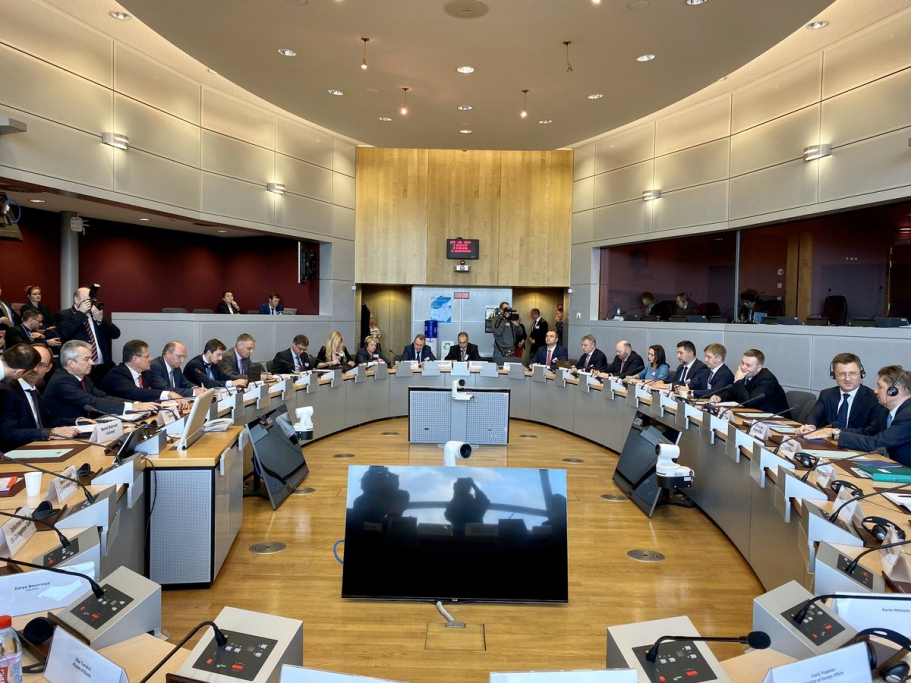UKRAINE MONITOR
Date: 30 October 2019
The Clock is Ticking: Ukraine and Russia Once Again Fail to Reach Agreement
Another round of trilateral talks between Russia, Ukraine and the European Commission on the transit of Russian gas through Ukraine from 2020 has ended in a fiasco. The negotiations, held on October 28 in Brussels, have failed to produce positive results. Although Ukraine seems to have the upper hand, Moscow remains uncompromising. One of the reasons for such state of affairs is the fact that the Russians will not be able to make the Nord Stream 2 gas pipeline fully operational by the end of this year, which simply means that they cannot yet completely abandon the Ukrainian direction, provided, of course, that they want to supply the contracted amounts of gas to the EU.

A contract for the transit of Russian gas through Ukraine expires at the end of 2019. Both Kyiv and EU recipients of the Russian raw material fear that if no agreement is reached by then, Moscow will either stop or reduce gas supplies via Ukraine. This would be highly unfavourable to Kyiv for reasons of both security and economy. As of now, gas transit fees provide around $3 billion to the Ukrainian budget annually. Not only would Russia deprive Kyiv of these funds, but it would also cut off the country completely from the raw material from the eastern direction.
On October 28, another round of trilateral talks was held. The issues discussed included the duration of a new contract, the volume of transit and transit fees. The talks in Brussels were attended by Vice-President of the European Commission for the Energy Union Maroš Šefčovič, Russia’s Energy Minister Alexander Novak, his Ukrainian counterpart Oleksiy Orzhel as well as the heads of Russia’s Gazprom and Ukraine’s Naftogaz. The Ukrainian side is willing to accept new contract parameters presented in Brussels. The European Commission (EC) wants the contract to last for 10 years and to provide for the transit of between 40 and 60 billion cubic metres of gas per year. However, the Russian delegation was not able to agree to the proposed parameters at the time. Moscow is evidently playing for time. The Russians demand a package-like treatment of both the case of the expiring contract and the settlement of a ruling issued by the Arbitration Tribunal in Stockholm. The Swedish court ordered Gazprom to pay compensation to Naftogaz for failing to supply Ukraine with required gas amounts for the purpose of transit to the West. Gazprom owes Naftogaz $2.6 billion without interest. However, the Russian gas giant refuses to settle the debt. The company intends to take care of this matter when signing a new gas contract with Ukraine.
Support Us
If content prepared by Warsaw Institute team is useful for you, please support our actions. Donations from private persons are necessary for the continuation of our mission.
On October 18, during a meeting with Russian Prime Minister Dmitry Medvedev, the head of Gazprom, Alexey Miller, did not rule out the possibility of extending the current gas transit contract with Ukraine. He said that there might be no other option if there is no independent gas pipeline operator in Ukraine from the beginning of the year. Only the day before the meeting in Brussels, the Ukrainian government approved a resolution to unbundle a system of gas pipelines from the state monopoly Naftogaz. From January 1, 2020, a new state-owned company will be responsible for managing the transit of gas through Ukraine in order to avoid potential conflicts of interest and to increase the transparency of the energy market. As a member of the EU’s Energy Community, Ukraine is obliged to follow EU regulations in this area. Ukraine is currently in a much better position in this entire dispute. The country has already won the arbitration case and has gained EU support. The obvious link between gas issues and politics should also be easily noted. If Kyiv is to make some concessions on the Donbass, then Russia will be expected to make some concessions on gas transit. There are also many indications suggesting that Russia has not prepared a complete alternative route of gas supplies to Europe, as the Nord Stream 2 gas pipeline was supposed to be operational by the end of the year. The warm autumn weather is, without doubt, working in Ukraine’s favour. This has enabled Naftogaz to store 21.6 billion cubic metres of gas for the upcoming winter, a much larger amount than a year ago. By taking the opportunity of the talks on the gas transit agreement, the Russians intend to resume negotiations on selling Ukraine their own gas. As a matter of fact, Kyiv has not been buying gas directly from Russia since 2015. Miller emphasised on October 18 that the Russian side is expecting Kyiv to declare whether Ukraine will be buying Russian gas and if so, how much. He also added that the raw material would be much cheaper than the one Ukraine buys from the West, even though it is, in fact, the same Russian gas.
The next trilateral meeting is scheduled for November. It is possible that an agreement for the first half of 2020, which would automatically become a long-term contract after meeting the relevant conditions, will be signed.
All texts published by the Warsaw Institute Foundation may be disseminated on the condition that their origin is credited. Images may not be used without permission.














